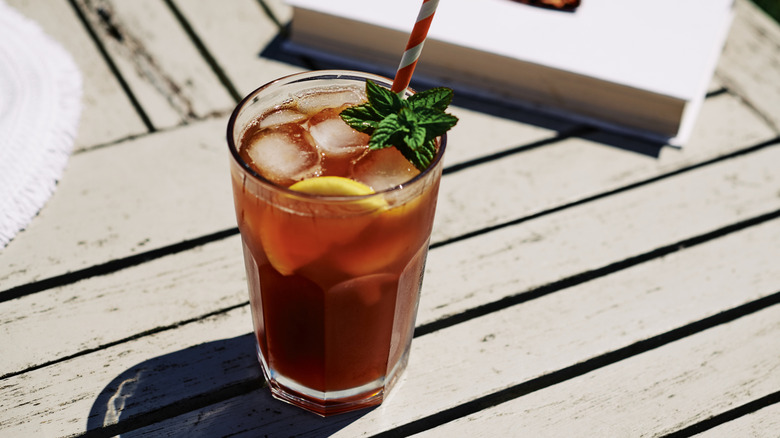Here's Why Your Iced Tea Always Comes Out Cloudy
There's nothing like a refreshing, herbaceous iced tea to help you hydrate, whether you sip on black tea every day for its energizing effects and powerful antioxidants or you prefer a caffeine-free herbal tea (fun fact: Herbal teas are actually considered tisanes because they're leaf infusions not made from the tea plant). But anyone who's made iced tea at home knows what it's like to pour their fresh brew over ice, only for it to turn cloudy and pack less flavor — a process known as "tea creaming." If this has ever happened to you, you're not alone, as many tea enthusiasts wonder why tea creaming happens and how to prevent it.
Tea, a popular beverage enjoyed worldwide, originates from the Camellia sinensis plant and consists of various soluble compounds, such as amino acids, calcium, sugars, and tannins, which are a type of polyphenol that contributes to the tea's astringency and color. As the hot tea extracts these compounds, they bind together and dissolve. However, when chilled rapidly, the tannins and caffeine in the tea will become less soluble and precipitate. In other words, the sudden change in temperature causes the compounds to clump together, creating that murky look.
This cloudiness is perfectly safe to consume, but it does affect the visual appeal of your iced tea and can dilute its flavor, making your brew less enjoyable. While tea creaming is a natural and harmless process, it can be frustrating for those who prefer their iced tea to be clear, crisp, and aromatic.
How to avoid cloudy iced tea
There are methods for de-clouding your hazy tea, but they come with drawbacks. You can try reheating your cup to dissolve the tannins, but you won't get to enjoy the beverage chilled, as it will form that same unfavorable haze again. You can also slowly dilute the hot tea with cold water, but this approach will only give you watered-down tea. Your best bet is learning how to prevent the haze from materializing at all.
Try brewing your tea with filtered water and allowing it to cool gradually at room temperature before refrigerating (just don't make the mistake of using tap water or low-quality tea). Sure, this process will take longer than steeping the tea in hot water, but it'll be worth the wait. Adding a pinch of baking soda can also help stabilize the tannins and maintain clarity. This method neutralizes the tannins and results in a smoother, clearer tea. Storing your iced tea properly in a sealed container can also prevent it from absorbing odors and flavors from the refrigerator, ensuring a fresh taste.
To further avoid cloudiness, consider the type of tea you use. Certain teas, particularly those high in tannins like black or oolong tea, are more prone to clouding. Meanwhile, green teas and herbal teas are less likely to become cloudy because they contain fewer tannins.

